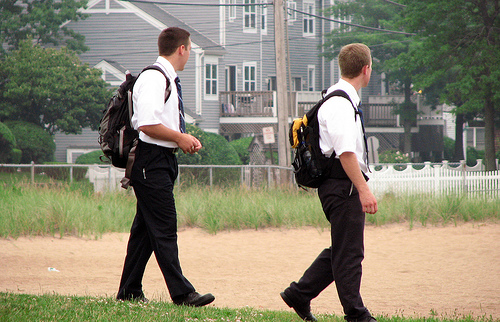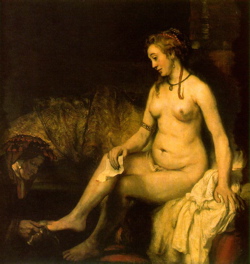
This month witnesses a surprising development in the relaunching of mormon.org, the LDS Church’s website for visitors and non-Mormons. (It runs another website, lds.org, which is primarily geared for church members, with links to lessons, talks, lime Jell-O recipes, and what have you.) For years, mormon.org has presented a slick and carefully manufactured view of Mormonism, emphasizing happy families and well-groomed people, the site graced with Sallmanesque art of the Savior.
It looked polished and corporate. It had the distinct whiff of the unreal.
On July 14, the Church launched something totally different. It’s putting mormon.org in the hands of ordinary Latter-day Saints, and letting them speak for themselves. Any LDS Church members with a password on lds.org can upload their profiles onto mormon.org, answering key questions about their faith and why they love the Church. Perhaps, finally, non-Mormons will be able to see what we Mormons have known for some time: we are not all the same. And that is a good thing.
According to blogger Kathryn Soper, who attended a rollout session where the changes were first presented to the Bloggernacle, the idea is to reconceive missionary activity so that real, live, actual Mormons are the ones painting a picture of their faith. And according to one of Soper’s commenters, the idea for this came up in a Boston-area singles meeting where members were encouraged to brainstorm about new ways to think about missionary work: “The top-voted proposals, one of which was this exact idea, were then presented to Elder Ballard, who would then bring his impressions of the ideas back to Salt Lake and perhaps implement one or some of them,” said the commenter. “Looks like they did!”
To which we should all shout hooray, not only that the Church is soliciting and implementing feedback from members, but that it’s swinging wide the barn doors in our shared ability to tell the world who we are. It’s a surprising move toward decentralization of the message, putting power back into members’ hands. We are all the Church, and we all have the right to speak up about it. Other websites are doing similar things, like mormonscholarstestify.org, which solicits the testimonies and conversion experiences of LDS scholars and intellectuals. Many voices are being heard.
But this democratization raises some questions in a church that for so long has carefully monitored its position vis a vis the world. Back in March, I wrote a strident editorial about Glenn Beck that was posted here on Beliefnet. Reading it now, I can see that I wrote it in anger (one of the spiritual dangers of blogging). For example, I wrote that I would “dance a little jig” if Beck decided to take his own advice and leave the decidedly pro-justice LDS Church, which some readers rightly pointed out was an unchristian attitude on my part. So while I don’t stand by every single thing I said in that editorial, I certainly do stand by my right to have written it.

Many people appreciated the piece, and many others disagreed, a few of them politely. But others questioned my right to publish it at all, saying, in effect, “She doesn’t speak for the LDS Church!” And that’s interesting, because nowhere did I claim to be receiving revelation for the whole Church, which, last I heard, is the exclusive job description of the LDS prophet. I was blogging and expressing my own opinion about my faith – something, I’ll point out, that at least one general authority has explicitly asked Latter-day Saints to do. It’s something that Glenn Beck does often, for better or for worse. I never claimed to be speaking for the whole Church, and it should have been clear from the editorial itself that I was one Mormon speaking among many.
One of the priceless gifts of the 21st century so far has been the empowerment of ordinary people to express their ideas in a nearly limitless format online. That’s only going to broaden with the continued democratization of information – and this is a fantastic thing.
I’m delighted that the Church recognizes that its greatest strength is not its buildings, its wealth, or its leaders. Its real power lies in its people, who are opinionated and real and flawed. And blogging up a storm.

